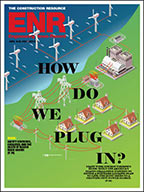The U.S. Nuclear Regulatory Commission has approved design of the first small modular reactor, a milestone that nuclear energy advocates say could revive the nation’s languishing nuclear sector.
The agency announced Aug. 28 it had issued the final safety evaluation report for a design developed by NuScale Power, based in Portland, Ore.
The report marks the final phase of the technical review of the safety aspects of NuScale’s design. The design approval does not grant permission to build and operate a nuclear reactor, however. That will require a separate application for a license to build and operate a nuclear power plant. But it is an important step that will allow a utility to reference NuScale’s design when applying for that license
Marc Nichol, senior director of new reactors at the Nuclear Energy Institute, called the NuScale approval a “monumental milestone” for the nuclear power industry. “NuScale’s design approval, the first of its kind, brings the country closer to meeting its clean energy goals and making electricity more accessible for all,” he said.
NuScale applied for certification of its small-nuclear reactor design for use in the U.S. in December 2016. The design uses natural passive processes including convection and gravity in its operating systems and safety features. The reactor's 12 modules in the reference design, each of which produces 50 MW, are submerged in a pool built below ground level.
NRC says it concluded, based on its technical review, that the design's passive features would ensure that a nuclear powerplant would shut down safely and remain safe under emergency conditions.
NuScale spent more than $500 million, with the backing of majority owner Fluor Corp. and more than two million labor hours, to develop information needed to prepare the design application. The firm has received more than $266 million of cost-sharing assistance from Congress since 2013 to accelerate design and certification.
Demonstration Project Step
NuScale already has a demonstration project in the works. In 2015, the U.S. Dept. of Energy awarded it $16.6 million in cost-sharing funding to prepare a license application to build a 12-module, 720-MW powerplant at the Idaho National Laboratory site in Idaho Falls, Idaho for Utah Associated Municipal Power Systems, a consortium of public power entities.
NRC approval of NuScale’s design is another step in the project’s advancement.
The first module is set to operate in Idaho by mid-2029, with the remaining 11 modules to come online a year later.
Construction of two new 1,100-MW units at the Vogtle plant in Waynesboro, Ga., the only new U.S. units currently being built, is several years behind schedule at a cost significantly higher than original estimates. Problems related to their construction have raised many questions about the nuclear power's future viability.
But according to the International Atomic Energy Agency, global interest in small nuclear reactors has been increasing, largely due to their ability to provide “flexible and affordable” power generation.
About 50 reactor designs and concepts are in various stages of global development with four in advanced stages of construction in Argentina, China and Russia.
NuScale has signed agreements with entities in the U.S. Canada, Romania, the Czech Republic and Jordan.
Similar agreements with other entities are being negotiated, the company says. NRC design approval “clearly establishes the leadership of NuScale and the U.S. in the race to bring [small nuclear reactors] to market,” says John Hopkins, NuScale CEO.



